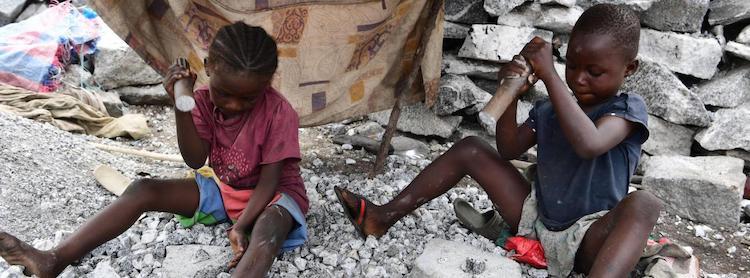By Thalif Deen*
UNITED NATIONS. 22 July 2023 (IDN) — The United States banned slavery centuries ago—going back to December 1865, along with a 13th amendment to the American constitution.
In 2021, the US declared “Juneteenth” —June 19—a federal holiday commemorating Emancipation Day and celebrating black history and black culture and the final days of the Civil War.
The United Nations annually commemorates the International Day for the Abolition of Slavery on December 2, but the ancient Transatlantic Slave trade has been replaced by Modern Day Slavery—including people-trafficking for sexual exploitation, child labour, forced marriages and the use of children in armed conflicts.
UN Secretary-General António Guterres says 50 million people were enslaved during the course of last year.
He said that “marginalized groups” are most at risk, including ethnic, religious and linguistic minorities, along with migrants, children and LGBTI individuals; and that most of these vulnerable persons are women.
Of the 50 million in modern day slavery, says the Geneva-based International Labour Organization (ILO), 28 million were victims of forced labour and 22 million in forced marriages.
At a press conference on July 20, US State Department Spokesperson Matthew Miller was asked about human trafficking in the US, particularly in Richmond, Virginia, and relating to Indian migrant labourers who arrive with “visitor” visas and are exploited as labourers.
QUESTION: Yesterday, a grand jury came up with a human trafficking case against two people. They were bringing in people from India and exploiting them—at their stores, restaurants, gas stations and at home.
MR MILLER: I would say that combatting human trafficking continues to be a major priority for this administration. It’s something that we work with—we work on as part of our diplomacy. It’s obviously a law enforcement matter. I don’t want to speak to the specific case because it is a pending law enforcement case, as you noted.
Meanwhile, a report released July 17 points out that survivors of modern-day slavery overwhelmingly need access to suitable psychological assistance, and yet nearly half said their needs were not being met.
Research from the University of Birmingham, the University of Nottingham, and the Survivor Alliance, funded by the Modern Slavery and Human Rights Policy and Evidence Centre and Arts and Humanities Council (AHRC) has assessed the experiences of survivors of modern slavery in getting psychological support.
Caroline Bradbury-Jones, Professor of Gender Based Violence and Health at the University of Birmingham and co-author of the report said: “For the nearly 50 million people around the world affected by modern slavery, the trauma that individuals experience threatens to affect their wellbeing long after they have been able to escape exploitation.
“This study is part of our portfolio of research within the Risk, Abuse and Violence research programme, where we have expertise in conducting participatory research with survivors. This latest report demonstrates how important survivors’ voices are in shaping the services they are accessing.”
Working with 90 survivors and 26 service providers across England and Wales, researchers found that although the majority of participants had been able to access some form of assistance for their wellbeing, nearly half felt that support was inadequate to address their needs.
Key findings include:
97% of survivors said that they needed psychological assistance, and
81% of survivors had received some form of support – either individual counselling, group support or wellbeing activities, but
44% of those who needed assistance said that their needs were not met.
Survivors raised the need for holistic and culturally-appropriate assistance with specialist services, noting that many providers didn’t have suitable familiarity with the unique challenges faced by modern slavery survivors.
Financial support to travel was identified as a key barrier to accessing services.
And 26% of survivors said that not getting access to suitable accommodation was a key factor for their poor mental wellbeing.
Nancy Esiovwa from the Survivor Alliance, one of the authors of the report, said: “For me, going through the project where survivors of modern slavery were able not only involved from the start, but were able to themselves define what mental wellbeing means for them, was a game changer.”
“Unfortunately, it’s not a standard practice yet but we hope this project will help expand the space where survivors can come as experts on research projects and help inform policies and practices.”
“It was also eye opening to see how differently survivors see wellbeing to those who support them. Whilst practitioners tend to address mental health challenges such as the lack of sleep or anxiety in relative isolation, survivors see a much wider picture, with issues such as uncertainty immigration status, lack of access to jobs or education having a big impact on their overall wellbeing.”
The report also says that to best understand the way in which modern slavery survivors experience access and barriers to wellbeing support, seven survivors were recruited as peer researchers to co-produce the project.
As well as gaining insights through the peer researchers, the report also reflects on key ways to develop and facilitate peer researchers from modern slavery survivors.
Liz Williams, Policy Impact Manager at the Modern Slavery and Human Rights Policy and Evidence Centre (Modern Slavery PEC), which funded the study, said: “We would like to see survivors of modern slavery meaningfully involved in research. This is why we funded this study, to add to the learning on how to build towards that goal more effectively.
“Only by including survivors as peer researchers we can truly understand what is key to survivors’ wellbeing and recovery and for policies and programmes to support it.”
 *Thalif Deen is author of the book “No Comment – and Don’t Quote Me on That,” is Editor-at-Large at the Berlin-based IDN, an ex-UN staffer and a former member of the Sri Lanka delegation to the UN General Assembly sessions. A Fulbright scholar with a Master’s Degree in Journalism from Columbia University, New York, he shared the gold medal twice (2012-2013) for excellence in UN reporting awarded by the UN Correspondents Association (UNCA). [IDN-InDepthNews]
*Thalif Deen is author of the book “No Comment – and Don’t Quote Me on That,” is Editor-at-Large at the Berlin-based IDN, an ex-UN staffer and a former member of the Sri Lanka delegation to the UN General Assembly sessions. A Fulbright scholar with a Master’s Degree in Journalism from Columbia University, New York, he shared the gold medal twice (2012-2013) for excellence in UN reporting awarded by the UN Correspondents Association (UNCA). [IDN-InDepthNews]
Photo: Children work at a granite mine in Burkina Faso in 2020. UNICEF is working to withdraw and educate children aged 3 to 12 and place young people aged 14 to 17 in training. Credit: UNICEF/Frank Dejongh
IDN is the flagship agency of the Non-profit International Press Syndicate.
We believe in the free flow of information. Republish our articles for free, online or in print, under Creative Commons Attribution 4.0 International, except for articles that are republished with permission.

